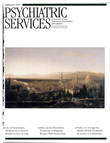Assessment of the quality of life of patients with major depression
Abstract
OBJECTIVE: This study examined the relationship between a measure of quality of life and measures of depressive symptoms among patients with major depression. METHODS: One hundred patients with primary major depression and 61 control subjects from the San Diego Veterans Affairs Medical Center and surrounding area were compared using a variety of measures, including the Quality of Well-Being (QWB) scale, the Hamilton Rating Scale for Depression, and the Beck Depression Inventory. RESULTS: After analyses controlled for age, gender, family history of mental illness, and comorbid axis III diagnosis, subjects' scores on the QWB were significantly correlated with their scores on the Hamilton scale and Beck inventory. The severity of depressive symptoms was inversely related to quality of life as measured by the QWB, independent of the variables that were controlled for. CONCLUSIONS: The QWB is sensitive to symptoms of depression among patients diagnosed with major depression. The reduction in quality of life associated with psychiatric symptoms of depression is comparable to that observed among physically ill patients.



